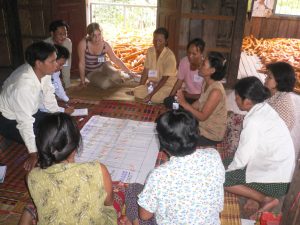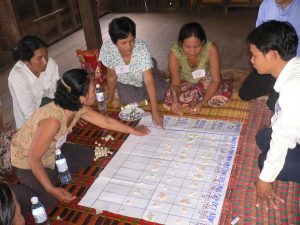Some Specific Technical Expertise
Microfinance Services provides a wide variety of consulting services relating to Microfinance. These include MFI institutional appraisals and program evaluations, business planning for MFIs, market research and new product development, marketing etc. We also are active in the field of microfinance and financial inclusion policy development and provision of support to the development and implementation of appropriate microfinance regulation and supervision.
Microfinance Services has been active in the development and delivery of many of CGAP's microfinance institutional development tools and training programs as well as Microsave's market research, product development, and marketing methodologies for MFIs. These tools and training programs are briefly described below.
|
CGAP Institutional Development Tools Microfinance Services staff are able to provide Microfinance Institutions with training in the following areas. MFIAppraisalTechnicalGuide (click to download pdf document 371KB) This tool provides a comprehensive structure for analyzing institutional structure, management and financial performance of MFIs. It is used for retrospective assessment of MFI performance. CGAP Business Planning Course (click to download pdf document 2041KB) The MICROFIN business planning process is a carefully structured strategic planning tool that is designed to be used in highly participatory manner with MFI staff. It leads the MFI from the initial steps of identifying or clarifying goals and objectives, analysis of the market for microfinance and other environmental factors, through to the development of detailed financial products, and operational management and financial management systems. Importantly MICROFIN helps bring together a financing strategy for the MFIs proposed development plan. Poverty Assessment Tool (click to download pdf document) The Poverty Assessment Tool (PAT) was developed for CGAP by the International Food Policy Research Institute. The multi-dimensional Poverty Index constructed by the tool is targeted at donors and investors who require a standardized, globally applicable set of poverty indicators to make poverty-focused funding decisions and to compare MFIs across regions and countries. Although it is more complex and costly than the simpler client-targeting tools used by MFIs (such as means testing, the Housing Index, Participatory Wealth Ranking, Rapid Appraisals, and Participatory Appraisals), and less comprehensive (and therefore less costly) than the World Bank¹s Household Expenditure Survey, the PAT nonetheless yields rigorous data that can also be used to rank large populations, determine the poorest inhabitants of large geographical regions, and make valid comparisons across regions and countries. Accounting for MFIs and Delinquency and Interest Rate Setting These two training programs are designed to increase the professionalism of MFI accounting and financial management procedures. This is often the technical weakness found in start-up MFIs or MFIs that have evolved from broad-based development programs. Financial Analysis for MFIs This CGAP training course teaches MFI staff the principles of operational and financial analysis. Particular attention is paid to the analysis of loan portfolios and operational and administrative costs, and bearing this has upon overall institutional profitability. Fraud Diagnosis and Internal Controls for MFIs This tool involves a three-day workshop followed by individual diagnostic consultancies. The workshop is designed to provide an awareness of the types of fraud that commonly occur in MFIs and suggests operational safeguards that can be put in place to reduce this risk. The diagnostic consultancy that follows assists MFIs to identify specific risks and weaknesses in the internal control procedures. Training of Microfinance Consultants This is a five-day course which takes participants through a process of responding to Requests for Proposals, negotiating terms of reference, fact-finding and data collection, interview techniques, analysis and concept development, relationships management, and oral and written presentation. The course is based upon the role playing of an MFI institutional analysis consultancy and also teaches key techniques in financial analysis.
MicroSave Tools Microfinance Services staff are trained in the use of MicroSave's Market Research for Microfinance and Microfinance Product Development and are able to train MFI staff in these techniques. Market Research for Microfinance The microfinance sector is still relatively young. Geographical expansion of microfinance services has been characterized by the replication of established products (such as the Grameen Bank or Village Banking methodologies). These products, while appearing to be "great ideas", very often turn out to be highly inconvenient to clients or result in the exclusion of important market segments (e.g. extremely poor clients). The market research approach has led to a breakthrough in traditional supply-driven thinking among MFIs and allows the development of highly appropriate, market-focused products and services. MFIs undertaking this analysis for the first time are almost invariably astonished by the degree of mismatch in their existing product structures with the needs and capacities of their target market. The market research for microfinance approach is based on participatory rural appraisal methodologies in which the researchers (working with MFI staff) develop an understanding of the needs and capacities of potential microfinance clients through simple information sharing exercises and non-structured interviews. New Product Development This technique draws upon the findings of the market research and systematically develops and tests new or modified financial products. These products are not only tested for their appropriateness to particular market niches but are analyzed with respect to their contribution to overall program profitability. Microfinance Product Marketing The Microsave marketing methodology covers both product promotion and client service. Product promotion is designed to ensure that product attributes and benefits are understood amongst the target market. The development of improved client services focuses on service delivery rather than product structure. Key concerns are the improvement of products in terms of their ease-of-use and accessibility. |



